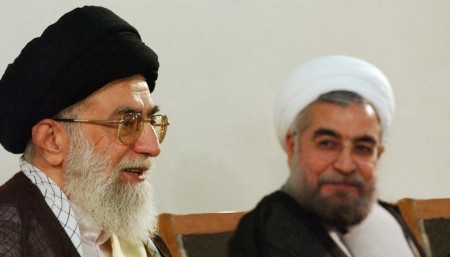PHOTO: Supreme Leader and President Rouhani
LATEST
Under pressure from the Supreme Leader over economic and foreign policies, President Rouhani has adopted Ayatollah Khamenei’s tough language on the “Resistance Economy” and Iran’s vigilance against “enemies”.
Speaking at a Cabinet meeting on Sunday, Rouhani said strengthening defense capabilities is a “strategic policy”, while “remain[ing] vigilant so that Iran’s enemies do not find any excuse” to attack.
The President went further with a warning that “Zionists” in the US, Europe, and the Middle East are trying to sabotage the Joint Comprehensive Plan of Action, the nuclear deal reached in July 2015 and implemented in January.
The statement was in marked contrast to Rouhani’s New Year message last weekend. Then he proclaimed the progress of the JCPOA and said that it would be followed by a “JCPOA 2” for recovery of Iran’s economy after years of US-led sanctions.
Hours later, the Supreme Leader warned Rouhani against the line, repeating that the US and its allies cannot be trusted. In contrast to the “JCPOA 2” initiative, Ayatollah Khamenei indicated that his office could take over economic planning, calling this Iranian year “Resistance Economy: Action and Implementation”.
Rouhani, whose Government must soon present its 2016/17 budget to Parliament, dropped his exaltation of “JCPOA 2” yesterday. Instead, he said that the “Supreme Leader’s glory is our glory” and that “we deeply believe in Resistance Economy policies”.
The President’s shift in language was foreshadowed on Saturday by Foreign Minister Mohammad Javad Zarif, amid a two-day visit by Rouhani to Pakistan. Rather than proclamation of the foreign policy of “engagement”, Zarif declared that Iran will continue to develop its ballistic missiles, despite new US sanctions and warnings that the matter will be taken to the UN Security Council.
See Iran Daily, March 27: Foreign Minister Zarif Defies US Over Missiles
Iranian Authorities Take No Action on Alleged Torture of Baha’i Detainees
The Iranian judiciary has refused any action over the alleged torture of Baha’i detainees by interrogators, according to the International Campaign for Human Rights in Iran.
The ICHRI says a six-page formal letter of complaints, signed by 12 Baha’is arrested in October 2012, was submitted to the judiciary.
Members of the Baha’i faith have been systemically persecuted by the Iranian regime for their beliefs, with imprisonment and a ban on their activities including higher education and employment in certain sectors.
According to Simin Fahandej, the faith’s spokesperson in New York, more than 80 Baha’is are currently held in Iranian prisons.
The 12 detainees, held from 11 to 45 days, set out details of their torture at the Amir Abad Prison, in Gorgan in northern Iran, and at detention centers in Golestan Province, northeast of Tehran:
On the first day of his interrogation, Mr. Behnam Hassani’s wrist was tied very tightly with a rope and attached to a metal ring. The ring was raised to a nail above his head such that only his toes could touch the ground. He was in so much pain that he started to scream and shout,” said the letter.
Then they brought him down and dragged him into a room and beat him. They pressed a pen between his fingers and hit him behind the head and on his mouth… Then they kept him under the rain for several hours on a cold night.
Is this what you call justice in the name of freedom and religion?
The twelve Baha’is were among 24 who received prison sentences from six to 11 years in January 2016 for “propaganda in favor of the Baha’i faith and against the Islamic Republic by being members of an illegal organization”, “implementing [proselytizing] projects in Golestan Province”, and “collaborating with enemy states by actively promoting sectarian, anti-Islamic, and anti-Shia objectives”. The letter accused the authorities of forced confessions to support the punishments:
They forced Ms. Hana Aghighian to go under a table and then kicked her body while asking questions. Are confessions legitimate when obtained in such an atmosphere of terror?
Ms. Aghighian was told that if she does not answer questions the way her interrogators want her to, then she would be handed over to others who would employ other methods.
“When she again did not respond to the interrogator’s liking, the interrogator tore up the interrogation sheet and stuffed it in her mouth.

